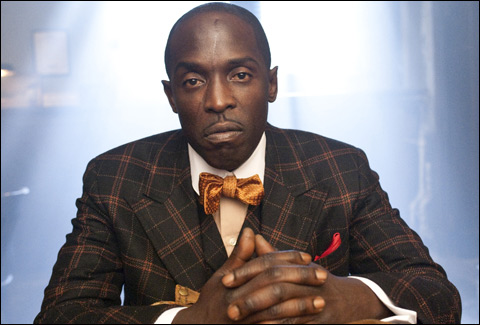 |
This Sunday will mark the premiere of Boardwalk Empire, HBO’s newest epic drama series. Set at the beginning of Prohibition in Atlantic City, the show recalls, at various points, past HBO classics like Deadwood and The Sopranos. (Creator Terence Winter was a writer and producer on the latter.) And the impressive cast includes Steve Buscemi as Enoch “Nucky” Thompson, a fictionalized version of bootlegging kingpin Nucky Johnson, Michael Pitt as a young man who works for Nucky, Kelly MacDonald as an Irish widow and member of a temperance group, Michael Shannon as a bootleg-busting fed, and Gretchen Mol as a showgirl. In the character of Chalky White, the leader of the African-American community of Atlantic City, Boardwalk Empire also brings us the most prominent role for Michael K. Williams since he walked the streets of Baltimore as the charismatic, menacing, openly gay stick-up artist Omar Little on The Wire, the HBO series that some consider to be the greatest television show of all time. I spoke to Williams — who sounded much more easygoing and relaxed than the characters he plays — by phone about this role, Boardwalk Empire’s period accuracy, and that scene with the Ku Klux Klan. Some light spoilers follow.
So, how did you get involved with this show?
I put myself on tape. I was in Cape Town, South Africa, working on a project up there, and I got the phone call about this. I bought myself a camera, taped myself, and then, boom! Pretty lucky.
Did you have to do any research?
Yeah, I did some research about the character, about Chalky — he’s a real person. I read the book. But pretty much everything was laid out for me when I got there — they [Winter and company] did a lot of research already, so I pretty much just followed their lead.
Were there things that were surprising to you to learn about that time period?
Not surprised, but I did learn a lot. Even though these guys were notorious gangsters, they made a huge contribution to the come-up of New York City and the country as a whole. Some of that blood money went to good use.
I wasn’t clear about this when I was watching, but Chalky is based on a real person.
Chalky White is a real person, yes. He was a boxer, actually.
There’s a mix of real and fictional people, so it’s hard to tell what was real and what wasn’t.
That’s the plan, actually. [Laughs] That’s the goal.
When you look at the world you guys are building, do you see any similarities to the world of The Wire?
The similarities that I see are in the amount of research that went into both stories. They were carefully rooted out, and the characters are well developed. But they’re totally two different worlds.
How was shooting that scene in episode five where you confront that incarcerated Klansmen?
That was surreal. That was a crazy day. I walked off set. I knew what it [an earlier scene set at a KKK rally] was about, but when you see 30, 40 white men with hoods on their heads, it kind of creeped me out a little bit. I didn’t go on set anymore until they called me to work. Normally, that’s not like me — I go peek in and check out what they’re doing. It just looked so real. To shoot that scene — I’m quite sure I have some family member that has suffered by the hands of the Klan. It was almost liberating for my ancestors to play a role like that and to do that scene.